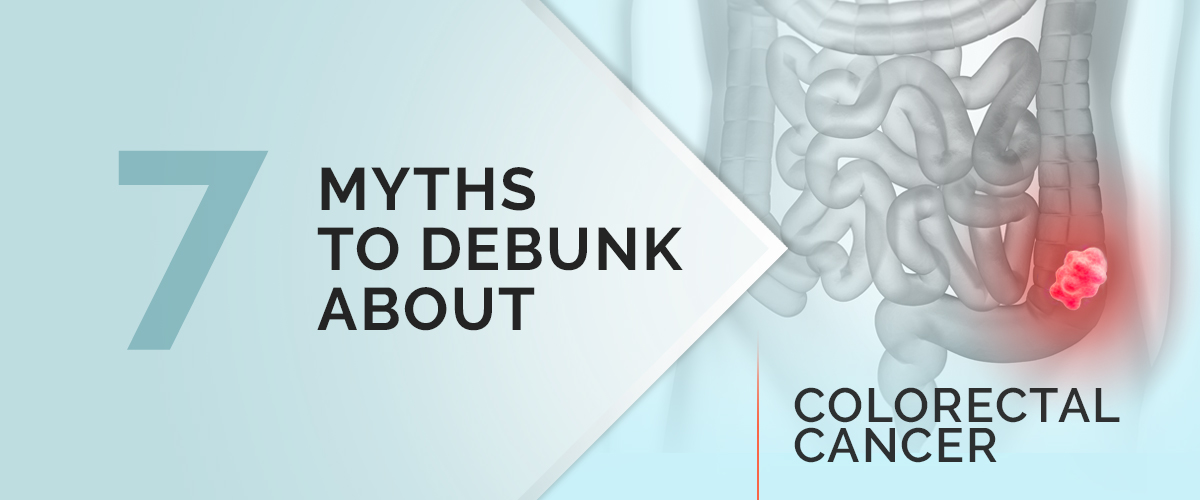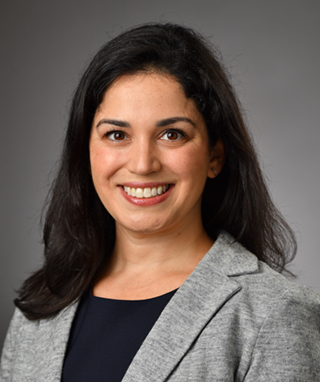Colorectal Cancer: Separating Fact From Fiction
With cases in young people on the rise, a gastroenterologist debunks common misconceptions around colorectal cancer and explains why early detection is so important.

“Isn’t colorectal cancer an ‘old person’s disease’?”
“I thought only people with a family history of colon cancer need to get screened.”
Myths like these abound when it comes to colorectal cancer, and these misconceptions can lead to unnecessary and unsafe delays in getting screened. That’s why it’s so important to know the facts.
Rates of colorectal cancer—which includes cancers of the colon and rectum—have plummeted for older people, likely due to regular screenings and changes to lifestyle-related risk factors, according to the American Cancer Society (ACS). But for younger people, rates are on the rise. Since the mid-1990s, rates have increased annually by 1% to 2% among people younger than 50.
“We still don’t know why there is this sudden increase,” says Dr. Sheila Rustgi, a gastroenterologist at NewYork-Presbyterian/Columbia University Irving Medical Center and an assistant professor of medicine at Columbia University Vagelos College of Physicians and Surgeons. “But one thing we do know—without question—is that with appropriate and timely screening methods, colon cancer is highly preventable.”
Health Matters spoke with Dr. Rustgi to debunk common myths and misconceptions around colorectal cancer and to better understand why early screening is so important.

Dr. Sheila Rustgi
Myth #1: I don’t have a family history of colorectal cancer, so I don’t need to get screened.
Colorectal cancer is the third most commonly diagnosed cancer in both men and women in the United States. While having certain genetic predispositions does increase a person’s risk, colorectal cancer can still occur in people with no family history of the disease. In 2021, the U.S. Preventive Services Task Force updated its guidelines to recommend everyone get screened for colorectal cancer starting at age 45, no matter their family history. This reflects the ACS’s guidelines, which were updated in 2018.
Myth #2: Colorectal cancer is an old person’s disease, particularly older white men.
Colorectal cancer does not discriminate. It affects both men and women, and it affects all races. In fact, certain racial and ethnic minorities often experience more advanced and aggressive disease. African Americans are about 20% more likely to get colorectal cancer and about 40% more likely to die from it.
“Colorectal cancer can affect everyone, and screening saves lives,” says Dr. Rustgi.
For the general public, get screened at 45. If you have a family history, get screened ten years earlier than the age at which your relative was diagnosed (or at 40, whichever comes first). If you have any symptoms like a persistent change in your bowel habits, rectal bleeding, persistent abdominal discomfort, or a feeling that your bowel doesn’t completely empty, discuss them with your doctor regardless of age and consider a colonoscopy.
Myth #3: A colonoscopy is painful.
“This is probably the most common myth out there that is totally untrue,” says Dr. Rustgi.
During a colonoscopy, an exam used to detect abnormalities in the large intestine (colon) and rectum, patients are sedated with anesthesia and are asleep during the entire procedure. “It’s like you’re taking a pleasant nap, then you wake up and it’s done,” she says. “The solution that you drink to prepare for a colonoscopy is a laxative to flush out the colon and doesn’t taste good and can be a little nauseating, but there shouldn’t be any pain.” During a colonoscopy, gastroenterologists can also remove any polyps (small clumps of cells that form on the lining of the colon) or abnormal tissue, which can prevent it from growing into a tumor.
Colonoscopies continue to be the gold standard in preventing and detecting colon cancer. They are safe and effective and can save your life.
Myth #4: Colonoscopies are inconvenient and embarrassing.
“Without dismissing people’s feelings, a colonoscopy is a relatively small inconvenience compared to potentially missing an early onset colorectal cancer,” says Dr. Rustgi.
Typically, a colonoscopy only requires one day off work. “The day before your colonoscopy, you can work normally, you’re just on a limited diet, which might mean clear liquids like chicken broth or a small low-fiber breakfast like eggs and white toast,” says Dr. Rustgi.
The prep drink will take about 12 hours, start to finish: You drink the first half of the laxative the night before, and finish it in the morning. Once you take the prep drink, your diet should be clear liquids only until the procedure. The procedure itself is only 30-45 minutes, and you’re back to normal activities the following day.
“What I tell people is, it’s one day of your life, hopefully not more frequently than once every 10 years to prevent colon cancer,” she says.
There is also no reason to be embarrassed. Your body is completely covered during the exam, and your gastroenterologist is focused on a monitor displaying the inside of your colon. They also perform these procedures frequently.
“It’s not as scary as people think, and once people learn more about it, they realize that,” says Dr. Rustgi. “One of the most common things my patients tell me after their colonoscopy is, ‘That was much less of a big deal than I thought it would be. I wish I would have done it sooner.’”
Myth #5: A colonoscopy is the only way to detect colon cancer.
A colonoscopy is not the only way to detect colon cancer. Noninvasive stool-based screening tests are also an option. These don’t require any special diets or procedures and can be done at home and submitted to a lab where the sample is tested for precancerous and cancerous cells. Stool-based tests are a convenient way to detect colorectal cancer early, when it is easiest to treat and is potentially curable.
However, they are not recommended for people who have had polyps in the past or a family history of colorectal cancer, and can’t match the benefits of a colonoscopy.
“Stool-based screening tests can’t prevent colorectal cancer the way that a colonoscopy can, since precancerous colon polyps are not removed,” says Dr. Rustgi.
“And if a stool-based screening test is positive, you will need to have a colonoscopy to find out why,” she adds.
Myth #6: If I am diagnosed with colorectal cancer, it means I’ll have a colostomy bag the rest of my life.
This is definitely not true for everyone who undergoes colorectal cancer surgery. Many patients do not need a colostomy bag (a pouch to collect stool or urine). “If you do have to have surgery to remove a cancerous polyp or a section of the colon, you might notice a change in your bowel habits, but we always want patients to feel like they have control,” says Dr. Rustgi. “We don’t want anyone to feel like they’re having diarrhea or incontinence.”
The benefit of doing colon cancer screening is not only to prevent colon cancer, but also to find it at an earlier stage. The earlier the stage, the more treatment options there are.
Myth #7: I can’t do anything to reduce my risk of getting colorectal cancer.
There are a number of lifestyle changes that everyone can make that can reduce your risk of colorectal cancer:
- Don’t smoke. And if you smoke, quit.
- Maintain a healthy weight through diet and exercise.
- Reduce the amount of red and processed meats you eat.
“The most important thing is to get screened when you need to,” says Dr. Rustgi. “If you have a family history of colon cancer, you’ll want to be screened earlier than 45, typically 10 years prior to when your relative was diagnosed. If you don’t have any family history of colon cancer, talk to your doctor about starting screening at age 45. You can discuss what the best option is for you in your personal situation—whether that’s a colonoscopy or a stool-based test.”
Additional Resources
Learn more about your digestive health and colorectal cancer screening.
Sheila Rustgi, M.D., is a gastroenterologist at NewYork-Presbyterian/Columbia University Irving Medical Center and an assistant professor of medicine at Columbia University Vagelos College of Physicians and Surgeons. Dr. Rustgi has a special interest in the prevention and early detection of gastrointestinal cancers. She has published on the care of patients with pancreatic cancer, inflammatory bowel disease, and the impact of health insurance on patient care. Dr. Rustgi’s clinical interests include colon cancer screening, Crohn’s disease, ulcerative colitis, and general GI diagnoses such as IBS, as well as the care of patients at high risk for gastrointestinal cancer due to an inherited cancer syndrome.
